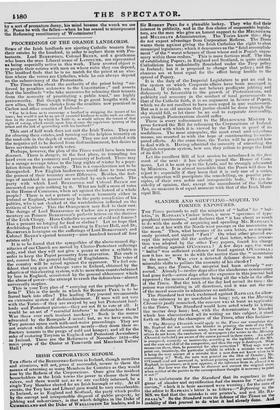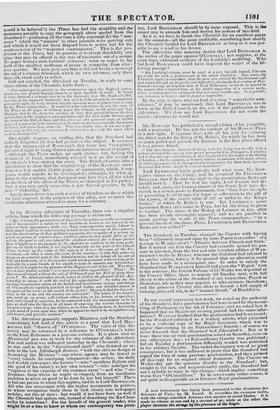SLANDER AND SHUFFLING—SEQUEL TO FORMER EXPOSURES. •
THE Times pretends to call the misprint of " ballot" for " bul- letin," in RAPHAEL'S Carlow letter, a mere " specimen of typo- graphical carelessness," and declares that " it has about as much to do with the mode of' acquiring and spending Mr. RAPHAEL'S 20001. as it has with the North-west passage or the mountains in the moon." Then, what becomes of its own letter, so conspicu- ously printed, and signed " Fact??" On what other ground ex- cept this misprint did the author of that letter, whose accusa- tion was adopted by the other Tory papers, found his charge of swindling against O'CONNELL? A few days ago, the word " ballot" was sufficient evidence of fraud against O'CONNELL; now it has no more to do with the matter than the " mountains in the moon." Was ever a detected defamer driven to such miserable shifts to palliate the enormity of his slander I But, says the Times, the misprint had been already " cor- rected." Already !—twelve days after the slanderous commentary had gone forth—seven days after the exposure in this journal had appeared ; the means of correction being all the while in the office of the Times. But the trick of the day had served its turn : the poison was circulating in all directions, and it was not the cue of the moral assassin to administer an antidote.
The Standard last week exclaimed against RAPH AEL for allow- ing the calumny to go unrefuted so long; yet, as the Morninc, Chronicle justly remarked, the censure was at least as applicable to the Times. The Standard would have acted wisely in letting the matter drop here; but, with the determination to blunder which has characterized all its writing on this subject, it stood forth on Monday the champion of the Times, after this fashion- " The Morning Chronicle would apply to the Times our complaint that Mr. Raphael did not correct the blunder in printing the note of the 18th. Why, in the name of common sense hew was the Times to correct it ? If others do not know, the conductors of newspapers (the writer in the Morning Chronicle included) are aware of the course pursued in these cases. An article is composed, correctly or incortecily, according to the legibility of the MS. and the care and skill of the compositor, and then the copy is destroyed. What means can there, then, be preserved for after correction ? What sage was to point out, intuitively, the particular syllable in which a mistake was made, it being the very essence of a mistake that a man does not know when he is committing it? Well, the note was printed on the 31st of October; Mr. O'Connell read and answered it, without pointing out any mistake ; and Mr. Raphael, in ignorance, as it now appears, of the inference from it, allowed it to stand. But how was the Times to discover and correct the original error, when neither of the parties to the correspondence thought it necessary to point it out ?"
It is unfortunate for the Standard that its copartner in the game of slander and mystification had the means for " after cor- reciion," which it is here assumed were wanting ; for the note of the editor to RA PH AEL'S letter is as follows—"Referring to the MS. we find that the mistake is our printer's, and not Mr. RA- PHAEL'S." So the Standard rests its defence of the Times on the inability of that journal to do what it had already dune. And (could it be believed ?) the Times has had the stupidity and the meanness actually to copy the paragraph above quoted from the Standard!—professing all the time a lofty contempt for the " non- sense" which the "ninnies" in other journals were pouring out, and which it would not have deigned thus to notice but for the condescension of its "respected contemporary." This is th:1 pro- fession of the Times, but its practice is to accept thankfully any alms that may be offered in the way of assistance out of a scrape. No paper betrays such habitual soreness; none so eager to lay hold of the smallest modicum of praise or sympathy, from what. ever quarter. We have just seen that it did not hesitate to accept the aid of a clumsy falsehood, which its own columns, only three :days old, stood ready to refute.
Still not satisfied, the Standard on Tuesday, in reply to some .observations of the Chronicle, holds forth- ,‘ Our contemporary posists in the controversy upon the Raphael corres- pondence, now plainly brought down to a mere squabble of trade. It boasts to have obtained a triumph Over us in the discovery that Mr. Raphael's MS. was nut, as we supposed, destroyed ; but, as it is to be presumed, as completely put out of sight, by being Hama into the immense mass of papers used as copy by the Times compositors. It would Lein low calculation to rate the copy of the Times at 18 pages of foolscap paper the column, or 18 quires per day. Multiply that by 28, about the number of days that passed between the lost publication of Mr. Raphael's correspondence and the first doubt thrown upon the letter of the 18th of June, and this gives us inn quires of cepy, or 12.09fi page. of manuscript to be investipated, in order to discover a mistake the nature of which had never been surmised. Who can doubt, that, if we are to pre- serve copy at this rate, tie embarras de riehesse has precisely the same effect as if we destroyed it."
One might suppose, on reading this, that the Standard had entirely forgotten all that had passed on the subject. It assnmes that the manuscript of RAPHAEL'S first letter was "completely put out of sight by being thrown into an immense mass of papers;" —although the Times makes no such excuse, but, having the document at hand, immediately referral to it on the receipt of RAellset.'s It tier stating the error. The Standard enters into a calculation to show that the original copy of the RAPHAEL mani- festo was lost amidst 12,096 pages of manuscript, which, it sup- poses, would require to be investigated ; although, for what ap- pears to the contrary, that document may have been all the 55 hile on the desk of the editor of the Times, or cherished in his pocket : that it was very easily accessible, is put beyond question, by the note " Referring," &e.
Surely there never was such a series of blunders as those which we have exposed in the progress of this affair, nor so much dis- creditable reluctance evinced to atone for a calumny.



























 Previous page
Previous page